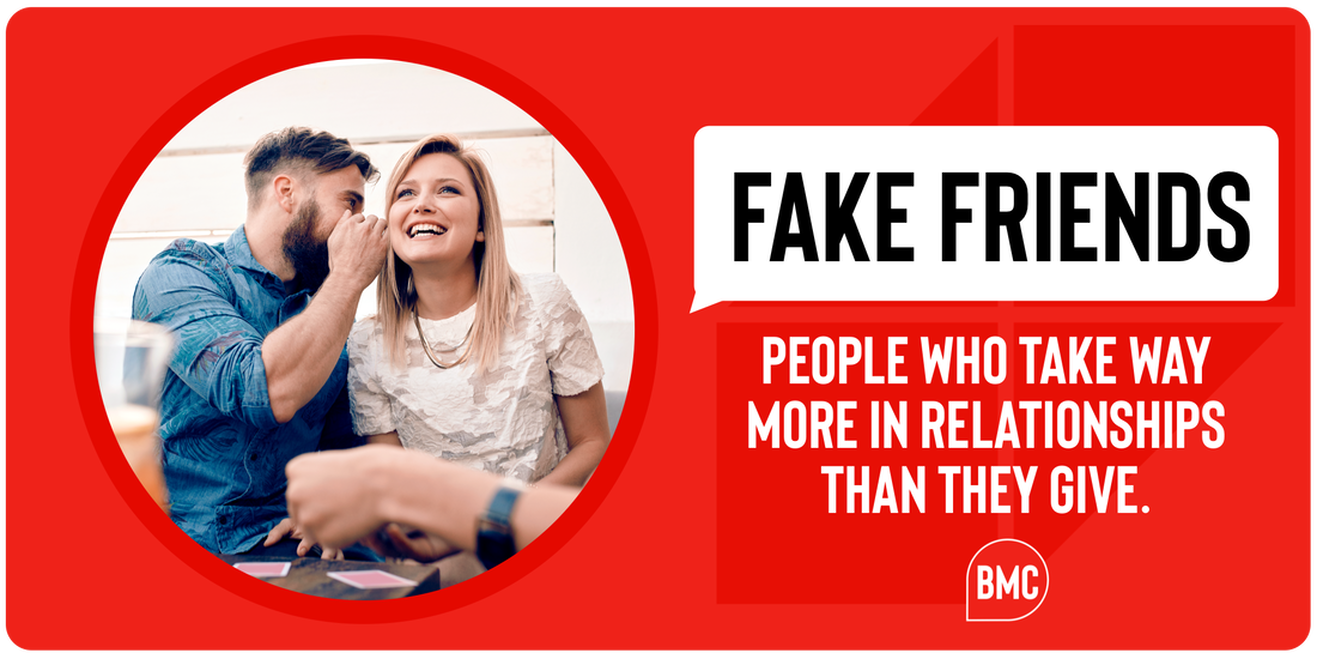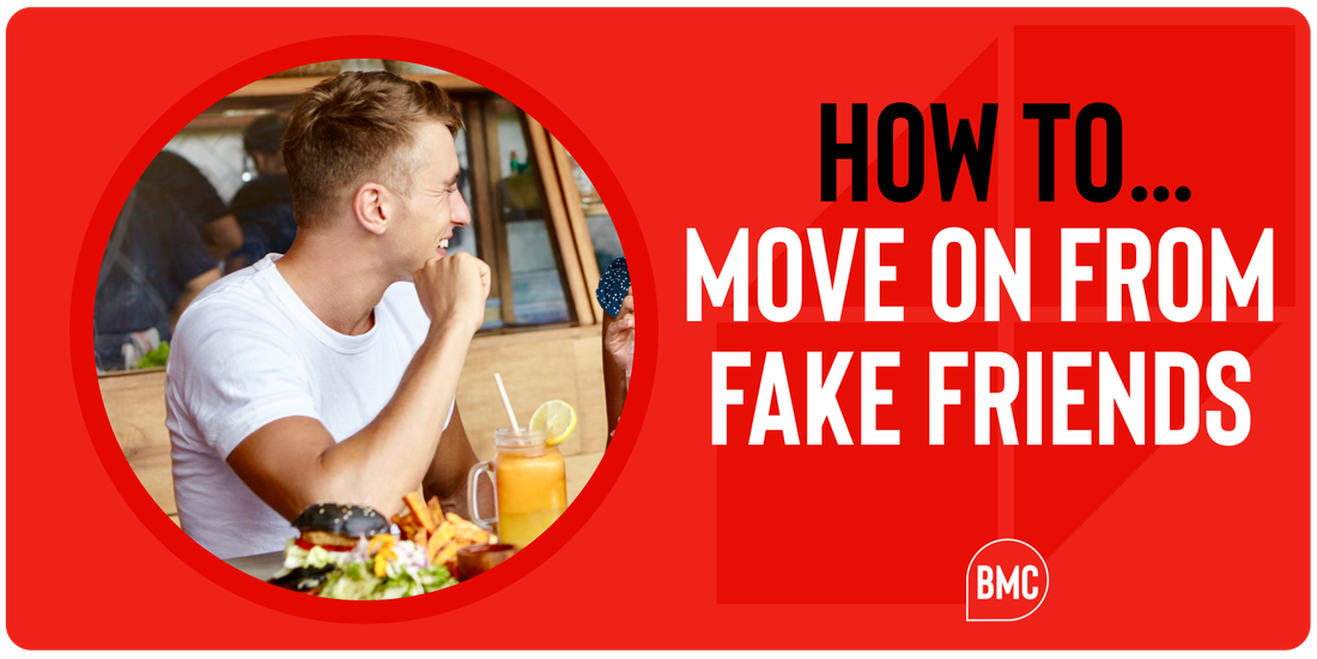Our friends are some of the most important people to us.
They support us, have fun with us, and inspire us!
Jim Rohn, entrepreneur and achiever, said it best:
“You are the average of the five people you spend the most time with.”
But what do we do when some of those people are fake friends?
Listen, we’ve all been there.
You’ve got a group of pals, but you’ve got a feeling that things just aren’t right.
When you’re surrounded by your REAL friends, your life is more awesome and hanging out is much less draining.
But how can you tell the difference between a real friend and a fake friend?
In this article, we'll cover...
- How to notice subtle fake friends signs and habits.
- How to spot fake friends from a mile away!
- How to move on from fake friends fast.
First…What are fake friends?

Fake friends are the people who take waaaaaay more in relationships than they give.
In a healthy friendship, we’re happy to give to our friends because they give back to us (their time, their energy, whatever!).
That real-friend balance is the opposite of fake friends, though.
With fake friends, they always seem to ghost you whenever you need them.
But if they need you? Oh boy, you bet they’re double or triple texting.
Okay, let’s dive in…here are 12 Ways to spot fake friends…
1. Do they only reach out when you need something?
If this friend is moving, you’re sure to hear from them. Maybe they need a favor, or want to ask to borrow something, or need you to spot them for a drink at happy hour.
They swear up and down they’ll return the favor.
“I’ll hit you back next time, promise!” But do they?
If you’re wondering if you have a fake friend, think about the last times they reached out to you first. If it’s usually because they want something, well, you’ve got a problem.
And these are the friends to cut off.
Which leads us to…
2. If you ask them for a favor, would they do it?
Let’s flip the script here.
Imagine you’re moving next month, and you ask your friend to help. Would they do it, or just ignore your text?
Imagine you’re a couple bucks short at happy hour, and you ask your friend to spot you.
Would they do it? Or maybe apologetically say they’re running low on cash? Those are both perfectly fine answers (the last one is a good boundary to set, actually).
The problem would be when your friend rolls their eyes and ignores you, or makes fun of you!
Healthy friendships are balanced!
Both people are willing to do favors for each other without feeling upset or their boundaries being trampled on.
3. When you share something exciting in your life, how do they react?
With real friends, your wins are their wins.
Who doesn’t want to see their friends happy and successful?!
Fake friends. That’s who.
The next time you have some exciting news to share, pay attention to how your friends react.
If they’re supportive? Amazing!
If they turn attention to themselves, or somehow cut you down, beware.
Common “fake friend” reactions to good news:
- “Do you really think you can do that?”
- “Oh yeah? Well listen to what happened to me!”
- “You probably got lucky...”
4. Do they build you up or cut you down?
Real friends like to see their friends win.
They support each other, root for you to be successful, and cheer you on!
Fake friends… Well, it’s the other way around.
Fake friends use their friends to build themselves up.
And, just like the average middle school kid, they build themselves up by cutting you down.
Here are some questions to ask yourself if you’re asking “Is my friend fake?”:
- Is your friend supportive of your dreams or success?
- Do they criticize you constantly (even as a joke)?
- Do they act jealous whenever you have a win?
- Do they diminish your successes?
5. Are they passive aggressive?
Passive aggressive comments are one of the sneakiest signs of a fake friend. But passive aggression can be hard to notice!
Has a friend ever made a hurtful comment, even lightly, and then brushed it off?
“Oh, I was just joking!” “You take everything so personally!”
Those sorts of comments can make you feel like you’re on an emotional roller coaster. And you know what? A real friend wouldn’t put you through that.
At the heart of passive aggressive behavior is emotional dishonesty.
Someone who’s making a lot of passive aggressive comment isn’t being open about what they’re feeling.
Maybe they’re upset, or maybe they’re jealous… But either way, they’re not telling you the truth!
And don’t we all want our friends to be honest?
6. Do you feel like you have to act a certain way around them?
It’s been said so often that it’s cliché: real friends love us just the way we are.
But the other side of that is… Our fake friends want us to act a certain kind of way around them.
Fake friends criticize our hair, the things we say, the way we act. And it’s not because the way we act is wrong! It’s because fake friends can’t accept us the way we are.
You know what? The way you are is great!
Real friends will love the things that make you unique, like your 10th Office reference of the night or the playlist of 90s jams that you rock out to while driving to work.
You deserve to have the kinds of friends who want to be around you just the way you are. (And don’t cut you down if you try to improve yourself)
7. Do they only talk about themselves?
Fake friends loooooove the spotlight.
And who doesn’t from time to time, right?
But fake friends love it all. The. Time.
A great way to identify fake friends is to pay attention to how much they talk about themselves.
Fake friends will find a way to make every topic of conversation about themselves. And I mean every!
Real friends will:
- Ask you questions about yourself
- Balance the conversation
- Not constantly interrupt
- Listen to what you have to say
Remember: A relationship is a two way street, not a dead end.
8. Do they avoid including you in plans with mutual friends?
The New York Times shared a story about Marissa Meizz, a woman with fake friends of her own.
Meizz didn’t realize her friends were fake until a random person on Tik Tok told her that her friends were deliberately planning a party while she was out of town.
The story has a happy ending, Meizz now has thousands of friends:
Fake friends won’t go behind your back to plan a party, or kick you out of a group chat, or avoid you at the bar.
Your real friends, especially a group of them, would include you in these plans-- or at least give you a heads-up!
Finding out that a group of friends is avoiding you can really, really hurt.
But you just saved yourself a lot of pain in the long run: you found out that you have some fake friends.
9. Do they constantly cancel plans with short notice?
You’ve made plans to watch the playoffs with some friends at a bar after work. It’s 3:35 and you’re checking your phone, hoping 5 will roll around sooner than later.
And your friend texts you to cancel.
“Sorry dude, rain check!”
And this would be no problem… If it wasn’t the THIRD time they’d cancelled in a month.
This is a key sign of a fake friend: they flake on plans all the time.
Your time is valuable, and a real friend understands that.
You can expect your real friends to respect your time and try to keep any commitments they’ve made to you… Unless there’s an emergency, of course!
10. Do they gossip constantly?
Think about what you and your friend always talk about.
Is it the third season of The Wire, which they’ve finally persuaded you to watch?
Or how terrible the most recent remake of a classic 80s film looks?
Or is it gossip?
Fake friends loooooove gossip. Having gossip about another person is like currency. Gossip can be spent, traded, or gathered.
But the worst part is… If they gossip with you, they’ll gossip about you.
11. Do they use you as an emotional vent?
The key word in healthy friendships is balance. If one friend is having a hard time, then the other listens and supports.
The exchange goes back and forth, keeping both friends happy and supported!
On the other hand, fake friends dump their feelings on anyone nearby.
Think about the last time your friend had a problem. Did they...
- Unload all of their feelings on you?
- Vent and rant without asking how you were doing?
- Do this for the third or fourth time in a row?
Beware of friends who use you as an emotional dumping ground. It’s exhausting, draining, and not balanced!
12. When their bad behavior is pointed out to them, do they actually change?
If any of these past habits seem a little too familiar, don’t worry.
Many of us go through phases of being less-than-perfect friends ourselves.
But one thing separates a real friend from a fake friend: the ability to listen and change.
If you have a friend whose behavior is bumming you out, how would they react if you brought it up to them?
Would they apologize for how they acted and try to do better?
Or would they get defensive? Does how they act improve over time?
Listen, we all mess up. We can all be selfish, or not support our friends the way we want to.
But what really makes a quality friend is the ability to apologize, listen, and do better in the future.
If they change their behavior, great! They may be a genuine friend!
But, if they don’t, it may be time to move on.
3 Ways to move on from fake friends

Okay, so you’ve got some fake friends. What now? How do you break the cycle and make some better friends?
Luckily, there are three easy steps!
1. Distance yourself from fake friends!
Your first step is to get some distance from friends that aren’t healthy for you.
There are two easy ways to get some space:
- The Clean Break
- The Slow Burn
The clean break is the most direct approach:
With the clean break, you directly tell your friend that you can’t continue the friendship anymore.
The easiest way to do this is with a text or an email, but any direct way of communication works.
Although The Clean Break can be really emotionally draining on the front-end, and can hurt to do to a friend, it’s also the fastest way to make a change.
If you’re wondering how to phrase a clean break, try something simple like this:
“Hey, NAME. I’ve been thinking a lot, and I think it’s best if we don’t hang out in the future because this friendship isn’t working for me. I wish you all the best!”
Now maybe that feels a little too direct or blunt, or you and your friend will have to see each other in the future.
Don’t worry, that’s why we also have The Slow Burn!
During a slow burn, stop responding to texts as often.
With the slow burn, your key attitude is medium chill: everything’s fine and boring, nothing to report, but also no new plans to make.
Keep it light and breezy and slowly excuse yourself from this person’s life.
Either approach is totally okay! I’ve tried both the clean break and the slow burn, and they feel very different. But the result is the same: you get your emotional energy back!
2. Resist the guilt!
Maybe your fake friend will accept your response and leave. But much more likely? You’ll get a major guilt trip.
No matter what, don’t fall for it!
Remember, in an unbalanced friendship, one person takes a lot more than they’re giving.
Your (now former) friend was getting so much from you!
Now that they’re not getting as much, they might put up a big fight.
They might say that you’re the one being selfish, or that they don’t understand what they did!
But you’re the only one who can decide what, and who, belongs in your life.
Maya Angelou once said “When someone shows you who they are, believe them the first time.”
Your friend has shown you who they are.
Believe them this time, and don’t give them a second time.
3. Connect with some new friends!
“Breaking up” with a friend can be really hard, but congratulations!
You’ve now cleared some space in your life for new friends that can improve your life.
Now it’s time to learn how to build some new (and healthy) friendships by reading this article on making friends as an adult.
In that article, you’ll learn
- How to meet new potential friends
- How to build social confidence that attracts others
- How to start meaningful conversations
- How to follow up with potential new friends after your first meeting
- How to tell when someone just isn’t into it
Next Steps
Want more tips to help you improve your people skills, make better friends and more?
Click the here and I'll send you my free 56-minute audio guide on joining and enjoying group conversations. (As well as Q&A videos, podcast, and much more)
In the audio guide, you’ll learn…
- How to jump into a conversation that has no opening
- Genuinely Connect With Anyone About Any Topic
- How To Get Out Of Your Head And Stay Present In Group Conversations
- And more (word-for-word scripts, body language while joining a group, etc)
4 ways I can help you level up your communication skills:
1. Private Coaching: I’m the secret weapon top Performers at Google, Netflix, and the US Army trust for people skills coaching. Imagine what I can do for you.
2. Social Accelerator: Social Accelerator is my proven self-paced + group coaching system for turning social awkwardness into confidence, overthinking into action, and hesitation into meaningful connections.
3. My group convos audio guide. Join over 5,000 overthinkers who have supercharged their group conversation skills using tested strategies in my 56-minute audio training.
4. My bestselling book Confidence-Maxxing. What I teach in this book comes from lessons that took me over 20 years and 100,000 conversations to learn. If you've ever felt like people skills are something you should've figured out by now but haven't, I wrote this for you.

I'm Jeff Callahan
I make it nearly impossible for overthinkers to fail at improving their people skills. (I've helped hundreds of people over the last 10 years)
Want to never run out of things to say in conversation again so you connect with more people and make new friends?
Want to speak up more in important meetings at work so you get promoted faster and have an awesome career?
Want to develop unshakeable social confidence and competence so you can walk into any room and feel like you belong there?
As your coach, I'll help you move forward faster.



















